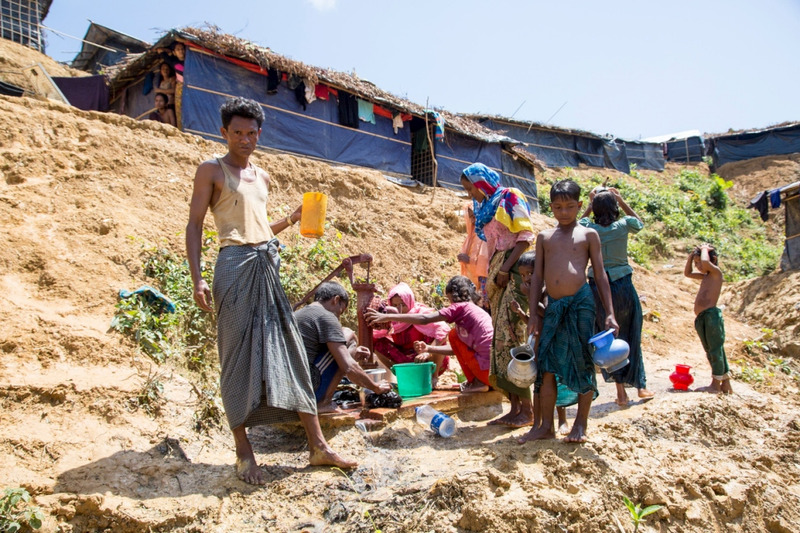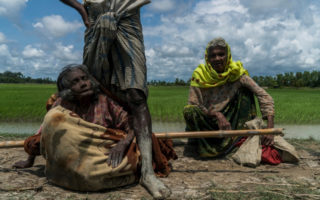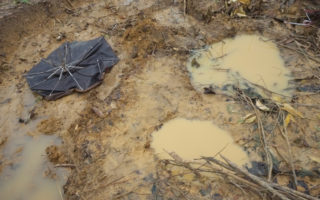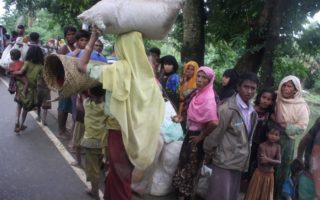
Rohingya refugee, Anu Mia (left), age 30, struggles to get clean water and sanitation in Kutupalong Refugee Camp Extension. © UNHCR/Roger Arnold
Racing to prevent a ‘disaster within a disaster,’ UNHCR ups vaccine, clean water and sanitation drives in informal Bangladesh settlements.
KUTUPALONG REFUGEE CAMP EXTENSION, Bangladesh – It is about 10 steps from mother Khaleda Begum’s flimsy shack to the well where she pumps water for drinking, cooking and washing.
From there, it is another few steps to a fetid, reeking creek which has become a toilet for her and thousands of other refugee families crammed into this area adjacent to Kutupalong refugee camp in southeast Bangladesh.
“We get all of our water from the well, and two of my children have diarrhea,” says Khaleda, 25, who knows full well what is causing it: “We need clean, safe water and sanitation – and we need it now,” she said.
Across the far side, amid a cluster of tightly packed bamboo and plastic roofed shacks, the story is the same.
“We are all getting sick.”
Father-of-three Anu Mia, 30, draws drinking water from the so-called tube well in a filthy plastic jug and mud-streaked water bottle, which he places on the dirt floor of his shelter, buzzing with flies. Both his sons are sick. Lala, seven, has diarrhea and Nor Kalim, eight, has a skin condition, producing angry welts.
“We are all getting sick,” he said while neighbours crowded into the shack nodded animatedly.
Khaleda and Anu, their families and neighbours are among the now estimated 480,000 Rohingya refugees who have fled the recent wave of violence in Myanmar. The vast majority now live in fragile and unsanitary conditions in informal camps and roadside settlements.
Since they began arriving in late August, Bangladesh authorities have reported 5,181 cases of diarrhea, 10,846 cases of respiratory problems, and 3,422 cases of skin diseases among newly arrived refugees – although the real number seems likely far higher.
UNHCR, the UN Refugee Agency, is very concerned that the lack of clean water and the unsanitary conditions that prevail in the vast tangle of informal camps and settlements could erupt at any time into a full-blown health crisis.
“We are trying to prepare ourselves, but if not enough is done, and not done quickly enough, then there is a risk of a disaster within a disaster,” says Hervé Isambert, UNHCR’s senior public health officer. “An outbreak can start at any time.”
UNHCR appreciates the concerted effort led by Bangladeshi authorities and partners to provide much-needed vaccinations to prevent potential outbreaks of polio and highly contagious measles.
UNHCR has called for redoubling of international humanitarian response and has brought in its fourth humanitarian airlift. The UNHCR-chartered Boeing 777 cargo jet, loaded with 100 metric tonnes of aid, landed in Dhaka on Sept 26. Given the dire shelter needs in south-eastern Bangladesh, this flight has been loaded with shelter materials only. Two more aid flights are being scheduled in the coming days.
During his visit to Bangladesh this weekend, UN High Commissioner for Refugees Filippo Grandi discussed the importance of working towards solutions with Bangladeshi authorities, but emphasized that for now, the immediate focus has to remain on fast, efficient and substantial increase of support to those who are so desperately in need.
“All the kids between six months and 15 years old are getting the vaccines, so this is one of the priorities that is on the way to being addressed,” added Isambert, who is a medical doctor specializing in public health.
Preventing outbreak of diarrheal diseases, which is always a threat when sanitation and hygiene are so poor, now is a priority.
UNHCR is also working to provide clean water and sanitation in the 2,000-acre (809-hectare) Kutupalong Refugee Camp extension. So far it has added seven deep tube-wells, 13 shallow tube-wells, and 116 latrine chambers, and is working to add more, at the request of Bangladeshi authorities.
In the camp extension area, one of UNHCR’s Bangladeshi partners carried latrine components – sections of concrete pipe – into the camp extension on bamboo poles. Once dug into the ground, they will be topped off with a footplate around an opening to create field latrines.
This met with the approval of refugee mother-of-four Abdula Hakim, whose shelter overlooks the site. So far she and her extended family of 10 have been going to the toilet “under the open sky.”
In the pop-up community facing huge challenges, the small addition of a latrine block is, she says, “life changing.”
Your support is urgently needed to help the children, women and men refuges in Bangladesh. Please give now.





